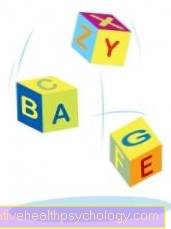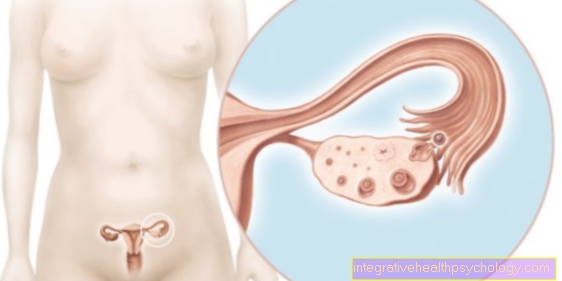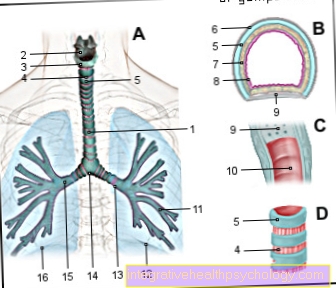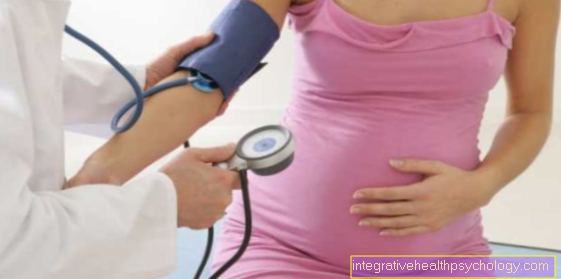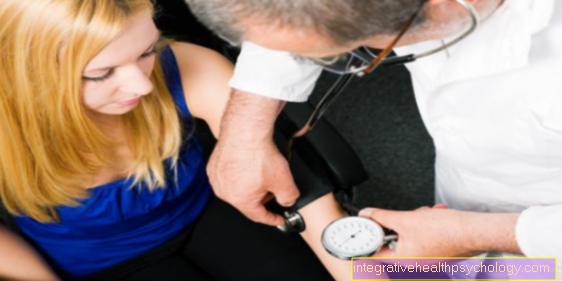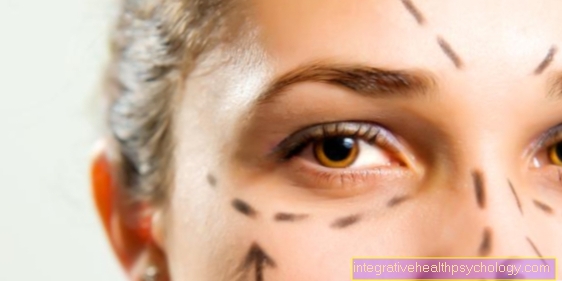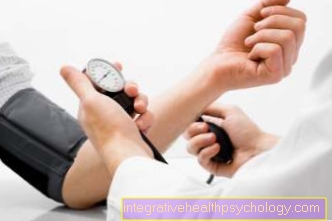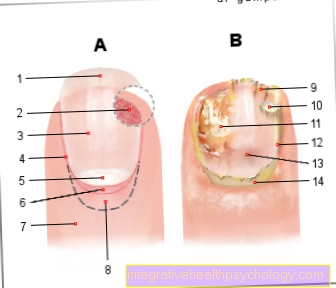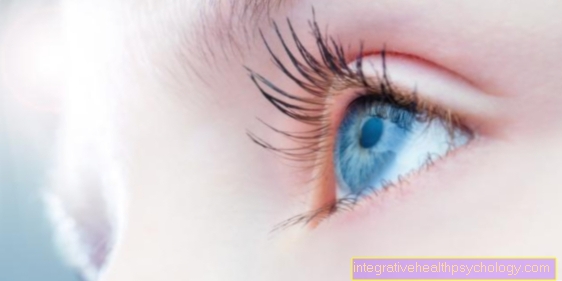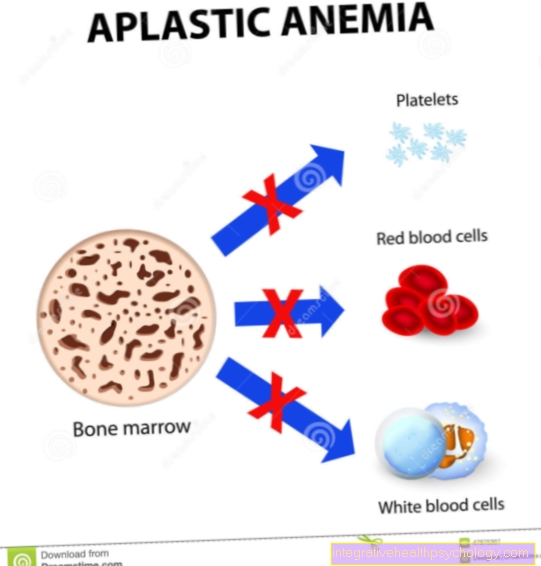Dizziness after exercise
introduction
Depending on the level of training, physical activity puts a considerable strain on the body. In the course of this, a dizzy or dizzy feeling can occur during or for a short time, i.e. around the hour after training.
In the German language, however, many different phenomena are summarized under the term vertigo. It is therefore important to first differentiate between dizziness as a discomfort in equilibrium and drowsiness, and to further distinguish in which direction the surroundings seem to be moving.

The reasons
Dizziness belongs to the group of unspecific symptoms that can indicate diseases of various specialties. To clarify dizziness, the most dangerous and then the most common causes should be ruled out first, before less common causes of dizziness are considered.
If dizziness always occurs in attacks during sport or other physical exertion, the circulation, especially the blood pressure, should be checked. The blood values can also be checked: An electrolyte disorder or an iron deficiency, for example, can cause an insufficient supply of oxygen to the brain during physical exertion and thus trigger dizziness.
Furthermore, causes should be considered that can cause dizziness at any point in time and not only during exercise: These include many diseases of the inner ear, including benign paroxysmal positional vertigo, vestibular neuritis or Menière's disease.
A special case arises when the sport includes activities in which the arms are lifted above the head and strained: This can hide a subclavian steel syndrome. This condition is due to a narrowing of a specific arterial section and is rare. Because of the variety of possible causes, medical advice should definitely be sought if dizziness persists while exercising.
For more information read on: The causes of dizziness.
The cervical spine syndrome as the cause
If permanent dizziness is accompanied by strong muscle tension in the neck and is aggravated by certain movements of the neck, it is called a cervical spine syndrome. The vertigo is then also called cervicogenic vertigo (lat. Cervix = neck).
This form of dizziness can occur, for example, after injuries or accidents, but it can also be triggered by certain “wrong” movements or incorrect loads. For those affected, not only the dizziness, but often also the feeling of restricted mobility due to the pain in the neck, is very agonizing. In terms of therapy, the focus is on muscle relaxation (see below).
Read more about the topic here: The cervical spine syndrome.
The iron deficiency as the cause
Iron in its atomic form is essential for the transport of oxygen in the blood. Since dizziness can also be caused by a lack of oxygen in the cells, iron deficiency is also a possible cause: In this case, the iron deficiency leads to a certain type of anemia: the red blood cells (erythrocytes) are not equipped with enough iron atoms to bind oxygen and can transport.
Particular attention should be paid to this possibility if corresponding accompanying symptoms indicate an iron deficiency: tiredness, rapid exhaustion or shortness of breath during physical exertion, brittle nails or hair, cracked corners of the mouth and also psychological or emotional instability can be indications of an iron deficiency.An iron deficiency can usually be determined relatively quickly and clearly by taking a blood sample.
Further information on this topic can be found at: Iron deficiency dizziness.
The accompanying symptoms
Since dizziness is a symptom that can have many different causes, there are a number of very different accompanying symptoms. The most common ones include nausea or vomiting and headache, but also neck pain, visual disturbances such as flickering in front of the eyes, hearing disturbances such as tinnitus or a fast pulse and palpable palpitations can be associated with the dizziness.
These symptoms provide important clues as to the cause of the dizziness, as they are often triggered by the same cause. The two most common symptoms are briefly explained below.
The nausea as a symptom
Nausea is such a common accompanying symptom because it is, so to speak, a natural reaction of the body to contradicting sensory perceptions such as dizziness: on the one hand, the inner ear and eyes communicate movement of the ground, on the other hand, everything seems to be fixed. Since the central nervous system perceives these types of perceptions as poisoning, the CNS tries to get rid of the poison in the gastrointestinal tract by vomiting.
Find out more here.
- Dizziness with nausea
- Dizziness and vomiting
The headache as a symptom
Another common symptom associated with dizziness is headache: Here, however, it is necessary to differentiate precisely where and how the pain is perceived. Headache and dizziness, if they occur together, can indicate an acute migraine attack (one-sided headache with visual disturbances, light sensitivity and nausea), an inflammatory process in the inner ear or a cervical spine syndrome with tension pains radiating from the neck to the head. But even with low blood pressure, there can be an unpleasant to painful throbbing in the head.
Find out more about the topic here: Dizziness and migraines.
The diagnosis
To diagnose dizziness, a detailed medical history must first be taken. This means that the doctor asks the person concerned about the time, duration, frequency, exact symptoms and accompanying symptoms of the vertigo. The type of sport and the exact time in relation to the sporting activity should also be discussed. It is important to distinguish in which type of sport the dizziness occurred and whether there was a fall or impact, for example against the head or spine, during the sport.
Blood pressure should also be measured routinely, as low blood pressure can also cause dizziness. Since dizziness is a generally common symptom that can occur in numerous different diseases, further diagnostics are based on the results of the anamnesis. In the further course of the diagnosis, a blood test can be carried out and certain positioning maneuvers can be carried out. Magnetic resonance imaging of the head may rarely be required to rule out causes in the brain.
Read more about the topic here: The diagnosis of dizziness.
The treatment
The treatment of dizziness is based on the results of the previous diagnosis or the presumed causes. A weak circulation can usually be brought under control with further but gentle training, plenty of drinking and, if necessary, a more salty diet. If there is anemia, the missing nutrients such as iron or vitamin B12 can be supplied with appropriate preparations.
If a cervical spine syndrome is the cause of the dizziness, regular physiotherapy can lead to muscle relaxation in the cervical spine and thus also to alleviate the symptoms. Causes of the inner ear should be treated by an ENT doctor. Depending on the cause, anti-inflammatory drugs, but also non-drug measures (such as positional dizziness) are used here.
Find out all about the topic here: The therapy of vertigo.
The duration
With adequate treatment, dizziness should never be permanent. However, not all causes of dizziness can be eliminated immediately. If the dizziness is caused by inadequate circulation, the frequency of dizziness attacks and their intensity will gradually decrease as the circulation begins to improve. It is the same with a cervical spine syndrome: Although the dizziness should slowly decrease after the start of therapy, it can take a few days or weeks in these cases until the symptoms are completely free.
For other causes, such as functional disorders of the inner ear, the dizziness should improve a few days after the start of treatment. However, especially with permanently low blood pressure, dizziness can relapse again and again. The strategy and the measures of the applied therapy should then be changed accordingly.


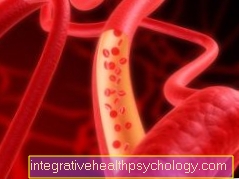
-cola.jpg)
